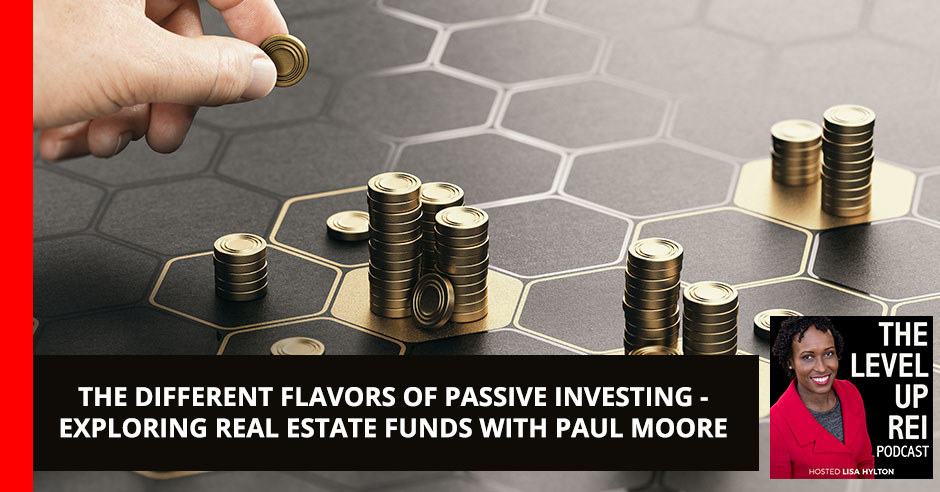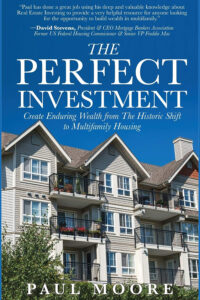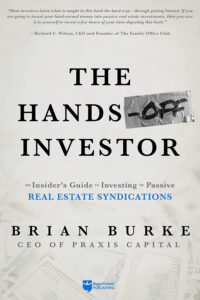
Is investing in real estate fund worth it? For Paul Moore of Wellings Capital, it is an excellent area to place your money into, but only if you fully understand both its benefits and risks. He joins Lisa Hylton to discuss what a typical investor will experience when getting into this kind of deal and properly navigate its disadvantages to lessen financial losses. Paul discusses how the right communication skills come into play in real estate funds, explaining how proper discussion impacts your connection with operators and fellow investors. Paul also shares what is the “perfect investment” for him, as well as the major reasons why he chose to invest in self-storage and mobile home parks.
—
Watch the episode here
Listen to the podcast here
The Different Flavors Of Passive Investing – Exploring Real Estate Funds With Paul Moore
I’m super excited to have on my show another amazing guest, Paul Moore. Paul offers a fresh perspective on creative real estate investing and philanthropy in 2021. After five years of working at Ford, Paul started a staffing company with a partner. Paul and his partner sold it to a publicly traded firm five years later for $2.9 million. Along the way, Paul was the finalist for the EY Michigan Entrepreneur of the Year two years straight, so that was 1996 and 1997.
Paul later entered the real estate sector, where he flipped over 50 homes and 25 high-end waterfront lots, appeared in HGTV’s House Hunters, and rehabbed and managed rental properties. He built a number of new homes and developed a subdivision and started two successful online real estate marketing firms. I’m definitely happy to have you on the show, Paul. Welcome. How are you?
I’m doing great. It’s such an honor to be here with you, Lisa.
It’s such an honor to have you on. Paul has a podcast. Despite the past couple of years, they’ve decided to pause on making any future episodes, but those past episodes are still present. His podcast is called How to Lose Money. To kick things off, because that is the elephant in the room, can you share why you called your podcast How to Lose Money?
Lisa, I would go to these conferences and see these amazing speakers on stage. They would be talking about their great accomplishments and I’m sure they were all true. They were great and they were inspiring, but I would notice people on the break and at lunch hanging their head, drooping their shoulder saying, “I’ll never be like those guys. I’ll never achieve that level of wealth and success. I didn’t have those connections and that Harvard education,” or whatever. I had this funny feeling that those people on stage weren’t telling the whole story.
When I eventually got on stage, I realized these speakers had the same problems, pain, failures, insecurities, relational tensions, and everything that everybody else in the audience had, but they just had pushed on and overcame. I thought, “Wouldn’t it give some people hope amidst all the thousands of great podcasts out there to have one where people told their pain, failure, and losses on the road to success, and it would give people hope?” We’ve interviewed amazing people like Cameron Herold, Gino Wickman, Mike Michalowicz, and all kinds of people about their pain and losses on the way to the top.
That is so powerful because many people give up thinking that it’s going to be a perfect road. When they hit those potholes in the road and they get that flat tire, they’re like, “This isn’t for me. I need to just go back in whatever I was doing before.” It’s totally powerful. To kick off this show, my readers know that I like to break out my show into three sections. One is background, and then two, we get into the meat of the episode, and then the final section is reflections and my level-up questions. To get started in terms of background, can you share with my readers where do you live?
The perfect investment is not perfect if you have to overpay just to get it. Share on XI’m in Lynchburg, Virginia, near the Blue Ridge Mountains.
What do you like to do for fun?
They asked me that on the BiggerPockets Podcast a couple of years ago and I was like a deer in the headlights because I love working and I love writing but writing is part of work, so I don’t have that much. I decided after the pandemic and everything else, like a lot of people, I’m going to do some fun stuff in 2021, so I bought a dirt bike. I’m buying a four-wheeler and I am going to get out and see the Grand Canyon and Zion National Park. I’m going to go fishing more and I’m going to do more fun stuff, so ask me again in 2022.
It sounds like that was all inspired by 2020.
It wasn’t all totally, but it was a wake-up call to me. I was like, “I’ve got all these future things I want to do but there’s no guarantee of the future.” I’m not talking about people dying of COVID. I’m talking about government, lockdowns, government oppression, and stuff like that, which has not been super helpful the way. I know that they didn’t know what to do. There was no roadmap for this. I thought, “The government and sicknesses and all these things can hit you when you don’t expect, so I’m not going to wait until I’m 64 or whatever.” By the way, I don’t ever plan to retire. I tried that when I was 34 and it was ridiculous. At any rate, I don’t want to wait anymore to do some fun things, so my son and I are both buying four-wheelers. We’re buying a trailer and we’re going to take them up in the mountains. It’s going to be a lot of fun.
Jumping into this episode, why I wanted to have you on the show is a couple of things. I love your experience. You have a book called The Perfect Investment. The Level Up Community are people who are interested in leveling up their real estate investing game and one of the main ways they want to do that is through passively investing in real estate. One of the hottest asset classes out there is multifamily, amongst others, and we’re going to talk about some of the ones that you’ve been in. Can you talk a little bit about this book that you have called The Perfect Investment? What is the perfect investment that you were referring to and why?
After doing investments like oil and gas, wireless internet, staffing firms, and all kinds of real estate like lots, homes, subdivision, lease-to-own, and small multifamily, I realized the power of the value formula for commercial real estate. If you ask me, I’ll go back to that because it’s one of the most important things about commercial real estate. The value equals the net operating income divided by the cap rate when I realized the power of that and when I realized how you could look forward to decades and see the trends that were leading to multifamily being such a great asset class.
When I saw the foreclosure and default rates and all the different things, even the government tampering of 1995-ish that led to so many things, I thought, “Multifamily is the perfect investment.” I said that in the book. The book was originally titled The Definitive Guide to Multifamily Investing. My friends said, “That’s so boring. Nobody’s going to buy that. You need something like Think and Grow Rich.” He said, “Didn’t you say it was the perfect investment? Why don’t you call it that?” I was a little afraid to call it that, but it’s caught on.
In the book, we talked about, first of all, the value formula. That’s in Chapter 8 is so powerful. We could talk about that the rest of the show or do a second show just on that. We talk about the fact that government tampering in the mid-1990s said that, “Everybody who can fog a mirror should be able to own a home.” Home ownership went up from the historical 63% to 64% range up to 69.2%. In 2006, 2007, 2008, and beyond, it crashed back down to the historical norm of 63%. Germany is in the 40%. Are we going more toward a European model where there are way more renters than homeowners?
Every 1% drop in that was a million new renters in a renter pool, but in 2008 and beyond, there weren’t a lot of new apartments being built. There became a supply and demand inequity sometimes of 7 to 1 where there were new renters in the system, people being foreclosed, and people saying, “I don’t think the American dream is owning a house anymore.” There were a lot of new renters in the system, but not a lot of new apartments. Even now, you’ve got Baby Boomers. They’re the smallest group of renters, but the fastest-growing.

Real Estate Funds: More and more people are choosing to rent but never go back to owning.
When they rent, they never go back to owning. You’ve got Millennials who are thinking, “Why would I want to tie myself down to a 30-year contract on a seemingly overpriced home when I might get new opportunities, new friends, new jobs across town or across the world?” You’ve got Gen Z people who we don’t even know for sure what their trend is going to be, but it looks like there’s a huge percentage it said that is going to rent rather than own. You’ve got immigrants. Immigrants tend to rent more often for longer on average than people born in the US.
You’ve got all these statistics going toward big multifamily. Big multifamily as opposed to small, I’m talking about 50, 70, 120 units or above, some people have it at different levels where you can get a property manager and a maintenance person on site. It’s hard for people who have great jobs, great careers, and great incomes to manage to go out and find, and then manage a 100-unit apartment complex. Syndication Laws have made it easy for us to tap into that, so millions of people who want to get the tax benefits, income stream, and growth of multifamily and other commercial real estates can now tap in through syndicators. There’s so much we could say about that.
As you said what you said, it made me think about your bio in the sense that you’re coming from a place of knowing how to flip because you’ve been in the flipping business of flipping over 50 homes and 25 high-end waterfront lots. You’re familiar with the type of commitment that’s required to get into real estate in that space. A lot of people are attracted to that space. When they get into it, they realize the amount of work that’s required. One of the biggest things is being able to introduce people to the fact, “They are real estate syndications. There’s the ability to invest in real estate passively.” We talked about your book. Multifamily was the focus there and that was 2016. In terms of your asset class, what is your focus now? Are you still focused heavily on investing in multifamily?
Don't invest in a fund or syndication that could potentially go wrong because things will go wrong. Share on XI still want people to go out and buy my book on Amazon. I’m being silly. The perfect investment is not perfect if you have to weigh overpay to get it. I’ve got some friends in a multifamily mastermind, people that your audience would have heard of, and we don’t all agree on this. They’ve been overpaying for their multifamily for some years. If there’s a big correction and if they don’t get the rent bumps that they expected, etc., there’s going to be some trouble, but so far, I’ve been wrong.
I thought COVID would bring a correction by now and it didn’t. I thought the economy would and it didn’t. Printing money like crazy, going on in DC, could mean that inflation brings a rising tide that raises all boats. Everybody who overpaid by 5% or 10% or 20% on multifamily may be okay, but I don’t want to build a business around may be okay. Self-storage and mobile home parks have been something that I was interested in and I realized there were some specific things about those asset types that attracted me to want to invest in those.
Can we get into what are those specific things that have attracted you to self-storage and mobile home parks?
I don’t think I had this thought through a couple of years ago when I went down this path, but I’ll tell you, now that I look back on it, there is a thing called intrinsic value. Michelangelo said, “The intrinsic value of this big hunk of marble is the sculpture inside.” He said he could visualize the sculpture inside. All he needed to do is chip away all the superfluous rock around it and he said there’s this intrinsic value that was greater. You can buy a $200 block of marble and make it into, with your Michelangelo, $1 million sculpture.
I want to find asset types where I can do that. It’s said that 93% of multifamily, that’s 50 units and over, are owned by corporations and companies who have already maximized the value. They’ve done the upgrades. They’ve done the paint, fixtures, cabinets, countertops, appliances, windows, doors, and carpeting. A large percentage of self-storage and mobile home parks are run, owned, and operated by mom-and-pop operators. In fact, of the 44,000 mobile home parks in the US, it’s believed, though not proven, that 85% to 90% are owned by mom-and-pop owners.
These folks don’t have the resources, the desire or the knowledge to upgrade the facility to maximize income and therefore, blow up the actual asset value. The rising tide of compressing cap rates has benefited them. In other words, they had a $2 million mobile home park that’s now worth $4 million. They’re tickled. A great operator could buy that $4 million mobile home park and send that owner into the golden years with an incredible amount of money in their pocket, but we could take that $4 million mobile home park and we could get it to where it’s worth $8 million within three years.
Using 50% leverage, which is a modest amount of leverage, means the equity in that example quadrupled in just a few years. I have seen this over and over with great operators who have a great acquisition strategy. They can buy these self-storage and mobile home parks and dramatically increase the income and the value on behalf of investors. That’s the thing I like overall. I also love that these are recession-resistant, sticky assets where people generally don’t leave. That’s the quick overview and I’ve got an hour’s worth of reasons behind that.
Connected to that, one of the things that are important to me as a passive investor myself as well as being a general partner as I look to deploy capital into other asset classes is assessing and evaluating operators. Right there, you talked about good operators and their acquisition strategy. Can you talk about maybe some of the things that you look at when assessing operators, specifically in the self-storage and mobile home park space?

Real Estate Funds: If you’re going to invest in syndication, be sure if you want to be in trouble with this syndicator for the next decade.
It is the same with multifamily, too. Wellings Capital has funds that go out and find the best operators with the best projects, best acquisition teams, and upgrade operating property management, etc. We put all three asset types possible in my fund, and then we invest in them. We provide diversification across geographies, asset types, operators, and assets. We look for the same things in any operator. We’re looking for operators who have been around since before The Great Recession.
Hopefully, as a company, but for sure, individually. We’re looking for people with a great track record, a great team of people. Not a diversified group of 1099s, but an internal team. We’re looking for people who are putting skin in the game and have money to lose. We want to see how they talk about their investors, spouse, and employees, and how they treat the waiter or waitress at a restaurant. We want to do a deep background and reference check.
We want to do Depth by Google to find out everything we can about them. Looking for SEC violations or looking for how they’ve treated their investors in the past and past indications and such. We’re diving deep. We want to go on gut feel, too. We want to sit with them for hours. We want to travel with them if possible and meet them at different sites. We drop in on sites unannounced. We do that every time. We invest in something. We want to see what they’re about and what they’re like. We want to get to know them and their assets.
We look at it this way. If you’re going to invest in syndication, you got to ask yourself, “Do you want to be in trouble with this syndicator for the next decade?” Even if they say it’s a five-year deal, what if it takes ten based on the economy or interest rates or whatever else? Do you want to be in trouble? There’s no trouble predicted. Nobody gets up in the morning planning to cause problems for their asset, but things happen. You got to ask yourself, “Do I trust this person to guide my investments and my family? Do I trust this person in a storm?”
You brought up the Wellings Capital fund. I got to say funds are all the rage. It feels to me like everyone I meet has a fund. This wasn’t a question that I asked you before, but are you able to talk a little bit about your fund, or is it protected? I know that some funds are protected and stuff like that.
Of course, I can talk about it. We started doing individual syndications and we realized, “You can take a huge hit on a property and you’ve got 50 investors all disappointed.” If I was across multiple operators, multiple projects, dozens of projects in dozens of geographies, there’s going to be a few disadvantages to that. There’s going to be a lot better chance that diversification will mean that one property is not going to disappoint 50 investors. That’s the easiest way to say it. The diversification across these different asset types, strategies, timeframes, brings to me a lot better balance for your investing. Especially if you’re a busy professional and IT person or a controller, you don’t want to have to worry about that one asset in Austin, Texas that had the big environmental hit or whatever.
By investing in a fund, I would feel that investor gets to diversify, but they’re not on the hook to find all the different operators themselves. If they have $50,000 or however amount is the minimum, they’re then investing $100,000, $50,000, $200,000 into this fund, and then they’re getting into a variety of different investments. Whereas finding individual investments, they’re going to need probably $50,000 to $100,000 to get into each. On top of that, you need to find and vet that operator. I’m guessing, going through a fund, they’re also relying on the fund manager who is doing their job to vet all the different operators and network and meet more operators to get exposure to more deals.
I had never thought of it that way. We have 74 assets in our fund we closed out. To go out and find 74 deals, $50,000 per deal, it doesn’t even make sense. There is a good book by my friend Brian Burke called The Hands-Off Investor. I highly recommend that if you’re going to find syndicators or deals or funds or whatever you do, check out this book because this book has lots of important things you need to know if you’re going to find a syndicator or a deal or a fund.
If you do a lot of hard work to find the right partner, you'll be a lot happier. Share on XThat’s absolutely right. We often get better deals with these people. Instead of a 60/40 split, for example, we might get an 80/20 split, or instead of a 7% preferred return in one fund, we get 9%, so we’re offsetting our fees. Those fees are real. That’s a real problem with a fund that there’s this so-called extra layer of fees. By finding the right operators who have outsized returns and doing all the due diligence we do and getting a better deal from them, we’re often offsetting or even better than offsetting our fees.
Can you talk about what are some of the fees that a typical investor will experience investing in a fund?
For us, a typical investor might get an additional 1% or 1.25% capital placement fee upfront. That would be in addition to whatever the operator is charging for their acquisition fee, and then an additional 1% asset management fee per year would be another thing, so that’s with us. A third one would be that we have an 80/20 split above the preferred return. It’s in the PPM, but there are no guarantees. Our investors get a projected 9% preferred return, which means they get the first 9% of all the distributable cashflow every year, and then an 80/20 split above that. Those are some things involved there.
I could go through them one by one, but in the last seven deals we’ve closed within our funds, one had a 70% IRR. The one before that had about a 49% IRR. Unbelievably, the one before that had 337% IRR. That’s where we doubled the value of a mobile home park in ten months and sold it and it had 50% or so debt. That’s the example I used earlier. Those types of returns, when you put those in the mix, I guarantee an individual investor could get those returns straight from the operator. The question is, do you have the time, patience, and knowledge to fly all around the country and find those operators? Chances are, most people don’t.
It’s because they’re working, so it’s going to be hard to manage doing all of that at the same time. That’s awesome. Connected to funds, can you talk a little bit about some of the disadvantages that you’ve seen from choosing to invest in funds?
Some people are controllers in their real life. They want to control everything. I had a guy argue with me a little bit on BiggerPockets. He said, “I trust myself more than anybody else. I want to do everything. I want to be hands-on. I want to be the reason a property is profitable or not and I get better profits. I get 100% of them when I’m in control.” I wonder if he uses Depth. I don’t know. The point is he wants to be in control. Some people do and some people would do better with that. They have the mindset and they have the ability to control things and to be in charge.
You shouldn’t probably invest in a fund or even syndication that has all these things that can go wrong because things go wrong. If somebody else is in control, it can make you pull your hair out, but if you’re in control, you can get on top of that yourself. A second reason is the second layer of fees. Let’s face it. If things go average and they don’t go as well as somebody would project, that extra layer of fees, that extra 80/20 split might hurt your returns. A third thing is I don’t call it a blind pool, but to an extent, when an investor gives me $100,000, they’re trusting me to place it well.
What if that person you trust either absconds with the money, takes off, and moves to the Caribbean or something? What if you’re the person they trust to do that? You’re trusting people with your money. Those are three of the disadvantages I see. Honestly, when you’re in control, if you have the money, time, bandwidth, and opportunity to control things yourself, that’s why wealthy families start what’s called a family office. They can hire their team to manage those assets and not trust somebody else with them.
Connected to how you answer that question, one of the things that came up for me is when an investment doesn’t go well. Can you talk a little bit about investments that haven’t gone well in your fund and how you communicate with your investors about that?
We did talk about that a lot on How to Lose Money. There are 238 episodes. We’ve had those and it’s quite painful. I’m sifting through three different ones in my mind. I’ll take the second one. We had multifamily syndication with 51 investors. This was years ago. We didn’t take my mentor’s advice in one area and it’s the one area that beat us. He said, “Don’t buy any multifamily before 1978.” I reasoned, “There’s stuff in New York City and LA that was built 100 years ago and it’s still okay.” I ignored that one thing because it was so hard to find deals. I bought a 1962 125-unit multifamily.
Some of the pipes in 1 of the 19 buildings failed and it was a $107,000 repair. I did the math on that and they said, “They could fail all over the community. This is one but there could be eighteen more buildings.” I did the math and I went to the investors and says, “We’re still in the ramp-up. We’re still in the first two years of getting this profitable. We can either sell right now and get about 81% or 82% of our money back or we can press on and hopefully, in the next several years, be profitable according to our original projections.”
Overwhelmingly, people said, “With given everything that’s happened, there was more than that. We would rather just get our money back now.” All but one investor that we talked to said that. We were honest and my business partners were uncomfortable with how honest I was. I said, “If you want to blame somebody, don’t blame the property manager. Don’t blame the plumber that did something wrong and cost us a lot of extra money. Don’t blame them. Blame me.” I went through all this and my partner’s thought, “You’re opening yourself up to a lawsuit.” I’m like, “I’m being as honest as I can.”
Furthermore, I felt so bad about this. I said, “I’m so confident of our company’s ability to turn this around that I am going to pledge to you that if you will reinvest with me, I will guarantee you to get the returns you originally expected. If you don’t, I will write you a check for the difference in ten years.” We had a number of those investors who said, “Sure,” and they reinvested and we put together an LLC. We’re tracking their returns versus the original projection. If we don’t exceed their original projection, then I’ll write them a check. I wouldn’t always recommend that, by the way, but I felt that I needed to that time.
This is a powerful conversation for whoever’s reading in the sense that you want to have people who are going to be honest and transparent with you in this business. You’re working hard for your capital each day at your W-2 or in your business. When you decide to invest it with an operator, you definitely want someone who is going to communicate and let you know what is going on so that way, you can then make a decision on what is best for you and for your business. Paul, I could keep talking to you forever. There’s so much stuff here. The more we got into this, there’s so much. We will have to do another episode definitely. I definitely would love to have you back on to talk more about funds and to get more on some of the other questions that I wanted to talk to you about, but I didn’t get to them as yet.
Let’s schedule number two. I love to do that.
To wrap up this show, looking back, getting into reflections, you’ve shared so much gems on this episode. Thinking about my audience, people who want to invest passively, what parting advice would you give to passive investors as they think about investing in the marketplace?
I was talking to a busy lady. She’s a smart lady. She and her husband set up an LLC. She was the brains behind this and they were talking about flipping houses. “How to find a flip house? How to find a fourplex?” They were pulling their hair. I talked to her for 1.5 hours and finally, she goes, “Why am I working harder than I need to, to make less than I could?” That’s when she invested in this case with us. It could have been with lots of other funds or syndicators as well.
One piece of parting advice is if you do a lot of hard work to find the right partner, you’ll be a lot happier and you won’t have to go through toilets, tenants, trash, and all the issues with self-managing while you have a life. I find that people spend their weekends, evenings, lunch hours, and even their vacations chasing that elusive real estate property that is usually not as fun or as profitable as they expect. The second piece of advice I would give is to delineate the difference between investing and speculating.
If you want to build wealth for the long-term, it's better to invest safely and make money over decades. Share on XInvesting is when your principal is safe and you’ve got a chance to make a return. Speculating is when your principal is completely at risk and you have a chance to make a return. The speculators get books, biographies, and videos made about them because of the exception. In general, if you want to build wealth for the long-term, especially if you’ve got a busy full-time life already, it’s better to invest safely and make money over decades.
My last question in this section here is. Can you talk about, given your experience being in this space, the secrets to the super-wealthy use to attain and maintain their wealth over generations? Maybe 1 or 2 of the secrets in that space.
The Tax Laws are set up to favor real estate investors. There are amazing benefits real estate investors get including using bonus depreciation, using the 1031 exchange, doing what’s called swap until you drop, and using Delaware Statutory Trust. There are all kinds of ways. I know a guy who showed me how to take $20 million and in twenty years, turn it into a portfolio worth $210 million, throwing off $131 million along the way. That was all amazing and that was all using commercial real estate, by the way.
What was even more amazing is he also said, “If you did this perfectly and navigated the Tax Law over twenty years, you wouldn’t be able to pay little to no tax at all. If that person passed away right then, their kids wouldn’t have to pay a penny in capital gains.” There are amazing things you can do. I know somebody who’s got real estate that was in the third generation now and they haven’t paid capital gains or depreciation recapture on that at all. It’s powerful. It’s one of the reasons that most of the Forbes 400 wealthiest Americans invest in commercial real estate. What do you think, Lisa?
Real estate has the ability to build long-term wealth for generations, so it’s a powerful way to invest. This then brings me to the level-up questions that I ask all my guests. The first one is, what are you grateful for in your life?
I’m grateful for my wife, who has tolerated my different entrepreneurial paths, you can say. I was chasing shiny objects over a good deal for 28 years since I left Ford. I don’t chase shiny objects anymore, but I did enough over the years and she tolerated all of it, even though her personal preferences for safety, security, and stability. I’m grateful for her and my four kids.
What has attributed to your success and continuous growth?
I will say a relationship with God where I trust Him that He’s got my best interests in mind and even when I make a mistake, that the overall trajectory of my life is going to go in the right direction. I can even use my failures, mistakes, and time-wasters to benefit me in some way.
Lastly, what do you now know that you wish you knew at the beginning of your journey?
I’d love to come up with something unique and creative. I’m going to go back to what I said about the difference between investing and speculating. People think low risk leads to low return. Therefore, high risk leads to high return or potential total loss. I remember times when I took every dollar in my bank account and plowed it into the next big thing. This was many years ago. I have an oil well in North Dakota. If that thing failed, all that money was lost. If you keep playing double or nothing with all of your available investable cash, then you’re going to end up on nothing at some point, and then what do we have left to double?

Real Estate Funds: Wealthy families start a family office because they can hire their own team to manage those assets and not trust somebody else.
Paul, thank you for coming on to the episode. I learned so much information from you in terms of your breadth of knowledge. A quick recap on some of the key things that I took away from this. First of all, Paul’s book, The Definitive Guide to Multifamily Investing. You can find that on Amazon. You can check it out to learn more about his thoughts on the perfect investment. We talked about self-storage and mobile home parks, his decision to pivot into that space, and how it’s beneficial given the current market space.
We talked a lot about funds and investing in them, some of the things to think about when looking for an operator as well as looking at different asset classes, and the advantages and disadvantages of investing in funds. Lastly, wrapping up here, I’m happy to have you on the show. Thank you for coming on. I appreciate it. If my readers would like to learn more about you, how can they go about finding more about you and getting in touch with you?
They can go to our website, WellingsCapital.com and we’ve got a resource guide there. It’s a free five-day commercial eCourse that gets people into the mindset and the behaviors of successful commercial real estate investors. Even if you’ve got a busy full-time career, we also have resources on investing in self-storage and mobile home parks. My book, The Perfect Investment.
Thank you.
Thank you, Lisa. It was a great honor to be here.
Important Links:
- Paul Moore
- How to Lose Money – Apple Podcasts
- The Perfect Investment
- Think and Grow Rich
- The Hands-Off Investor
- BiggerPockets
About Paul Moore
 Paul offers a fresh perspective on creative real estate investing and philanthropy in 2020. After five years of work at Ford, Paul started a staffing company with a partner. Paul and his partner sold it to a publicly traded firm five years later for $2.9 million.
Paul offers a fresh perspective on creative real estate investing and philanthropy in 2020. After five years of work at Ford, Paul started a staffing company with a partner. Paul and his partner sold it to a publicly traded firm five years later for $2.9 million.
Along the way, Paul was Finalist for Ernst & Young’s Michigan Entrepreneur of the Year two years straight (1996 & 1997). Paul later entered the real estate sector, where he flipped over 50 homes and 25 high-end waterfront lots, appeared on HGTV’s House Hunters, rehabbed and managed rental properties, built a number of new homes, developed a subdivision, and started two successful online real estate marketing firms.
Love the show? Subscribe, rate, review, and share!
Join The Level Up REI Podcast Community today:



Recent Comments